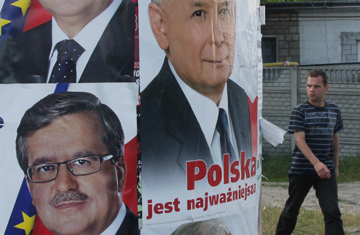
Election posters show presidential candidates Bronislaw Komorowski, left, and Jaroslaw Kaczynski in Warsaw, July 5, 2010
It's official: Poland's centrist candidate Bronislaw Komorowski just won the country's presidential election, beating the twin brother of the late incumbent, three months after Lech Kaczynski died in a plane crash in Smolensk, Russia, along with 95 other Poles. Komorowski, acting President and the candidate of the ruling Civic Platform (PO), received 53% of the vote compared to 47% garnered by Kaczynski's brother, Jaroslaw, the right-wing leader of the Law and Justice party (PiS).
The victory by Komorowski, 58, clears the way for the government to speed up reforms and strengthen ties with the European Union. It also gives the PO control of the presidency and Cabinet, and ensures smooth cooperation with Prime Minister Donald Tusk's economically liberal government to tackle a big budget deficit and prepare the country to adopt the euro in 2015.
"Voters have given the whole power to the PO in the conviction that, free from bickering with the presidential palace, it will ensure our country fast growth," one of the country's leading national dailies, the Dziennik, wrote in a July 5 editorial.
Poland's President has many ceremonial duties, but he can also veto laws and thus hamper the work of the government, a right that the former President exercised frequently to the point of blocking much-needed health care and media reforms.
Poland, under the cautious rule of the Tusk government, has been the only E.U. member that has avoided recession in the past year. But even though its finances are stronger than those of many European nations, the government needs to focus on controlling the budget deficit.
Komorowski, who as a speaker of parliament became the interim President after the April 10 plane crash, shares Tusk's vision of a Poland firmly anchored in the E.U., working closely with Germany and trying to improve long-troubled ties with Russia.
Meanwhile, Jaroslaw Kaczynski, 61, a combative nationalist, is opposed to adopting the euro anytime soon and is distrustful of the E.U., Russia and Germany. Poland's relations with its neighbors took a nosedive during Jaroslaw Kaczynski's stint as Prime Minister in 2006-07, while his brother Lech as President reinforced Warsaw's image in the European arena as a troublesome partner.
Jaroslaw Kaczynski called for increased spending to offset the impact of the global economic crisis and has campaigned to raise benefits for older people and boost the minimum salary. He has also promoted patriotic and conservative Catholic values, making him popular among rural Poles and older voters, in contrast to Komorowski, who campaigned on a greater separation of church and state and won among younger and urban voters.
Observers note that with Komorowski as President, Tusk will have no excuses now if he fails to push through promised reforms. The sentiment was best summed up by the tabloid Fakt, in a July 5 headline that blared, "The Civic Platform! You Have the Whole Power. Show Us What You Can Do with It."
But some observers say that some reforms such as raising the retirement age and trimming the welfare state could be too painful for voters and thus make Tusk's government wary of hurting the PO's chances in next year's parliamentary elections. A stronger-than-expected election haul by Kaczynski, who has softened his prickly image after the death of his brother, could strengthen the power of the PiS in local and parliamentary elections scheduled for 2011.
According to a July 5 report from Goldman Sachs, "[the outcome of the elections] is positive for the markets but fast reforms appear to be less and less probable because of the incoming local and parliamentary elections." When it comes to much-needed but tough reforms, there appears never to be a good time.
